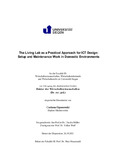Zitierlink:
http://dx.doi.org/10.25819/ubsi/10021Dateien zu dieser Ressource:
| Datei | Beschreibung | Größe | Format | |
|---|---|---|---|---|
| Dissertation_Corinna_Ogonowski.pdf | 10.42 MB | Adobe PDF |  Öffnen/Anzeigen |
| Dokumentart: | Doctoral Thesis | Titel: | The living lab as a practical approach for ICT design: setup and maintenance work in domestic environments | Sonstiger Titel: | Das Living Lab als praxelogischer Ansatz für IKT-Entwicklung: Aufbau und Betrieb in häuslichen Entwicklungsumgebungen | AutorInn(en): | Ogonowski, Corinna | Institut: | Fakultät III - Wirtschaftswissenschaften, Wirtschaftsinformatik und Wirtschaftsrecht Institut für Wirtschaftsinformatik (IWI) |
Schlagwörter: | Living Lab, User-centered Design, Meta-Research, Home IT, Lebendiges Labor, Benutzerzentriertes Design, Meta-Forschung, Heim-IT | DDC-Sachgruppe: | 330 Wirtschaft | GHBS-Notation: | QGTX | Erscheinungsjahr: | 2021 | Publikationsjahr: | 2021 | Zusammenfassung: | Living labs have garnered a significant amount of attention in human computer interaction (HCI) research. They have been established as practical approaches to the design of information and communication technology (ICT) mainly in the domestic domain and in private sectors. Research fields such as domestic domains and private sectors are characterized by both complex contexts and even more complex technical solutions, which are exposed to high competitive pressure from the consumer market. These circumstances create the need for a profound understanding of users and an iterative design process in the field of application to provide additional benefits to users or to uncover unexpected needs related to the designed solutions. Living labs address this need by focusing on an intensive and continuous co-creation process involving users and relevant stakeholders, including researchers, practitioners, and public institutions, in the design of new ICT solutions and services. The design process through living labs, which distinguishes them from other approaches, is characterized by long-term studies with sustained access to the field of application. The access to the field of application is not only used to elicit requirements but also to investigate appropriation and usage in real use contexts. Long-term co-creation studies in practice are characterized by intensive stakeholder and user interactions, users’ and stakeholders’ exchange of experiences and knowledge, and the management of living lab projects with respect to a variety of unpredictable factors in users’ everyday lives. However, few studies have addressed how co-creation and collaboration processes in living labs are actually managed and what kind of challenges have to be surmounted on social, technical, and managerial levels across the contributing groups in order to successfully establish and coordinate living lab research in a long-term and sustained way. This thesis addresses these issues via two overarching research questions: (1) What does it mean to establish living labs as practical approaches for ICT design in domestic environments? and (2) What are the challenges one faces in maintaining related infrastructural and social settings in longitudinal design processes, and how can they be addressed successfully? In order to answer these research questions, two living lab projects conducted in the domestic field are presented and analyzed from a meta-perspective. Both projects concerned the design and appropriation of ICT applications that support households’ everyday activities and were established as longitudinal studies in real-life settings, the participants’ homes. They followed a co-creation approach where users held a central role and were actively involved throughout the entire design process. Based on these two case studies, this thesis examines the organizational setup of research projects, the applied living lab environments, the selection of user samples, and the evolving work practices of stakeholders and users. The analysis focuses not only on the design processes but also on long term-related effects, evolving roles, and related social and ethical issues that living lab operators, stakeholders, and users had to address over a long period of time. This thesis contributes to four essential managerial principles addressing methodological, structural, and social issues of long-term collaborations in living labs. They are framed as the practical management of maintenance work, aims for cost reduction and process optimization, and intend to strengthen collaboration between the actors involved in living labs and foster their participation. |
DOI: | http://dx.doi.org/10.25819/ubsi/10021 | URN: | urn:nbn:de:hbz:467-20091 | URI: | https://dspace.ub.uni-siegen.de/handle/ubsi/2009 | Lizenz: | http://creativecommons.org/licenses/by-nd/4.0/ |
| Enthalten in den Sammlungen: | Hochschulschriften |
Diese Ressource ist urheberrechtlich geschützt. |
Seitenansichten
445
checked on 03.04.2025
Download(s)
103
checked on 03.04.2025
Google ScholarTM
Prüfe
Prüfe
Diese Ressource wurde unter folgender Copyright-Bestimmung veröffentlicht: Lizenz von Creative Commons


